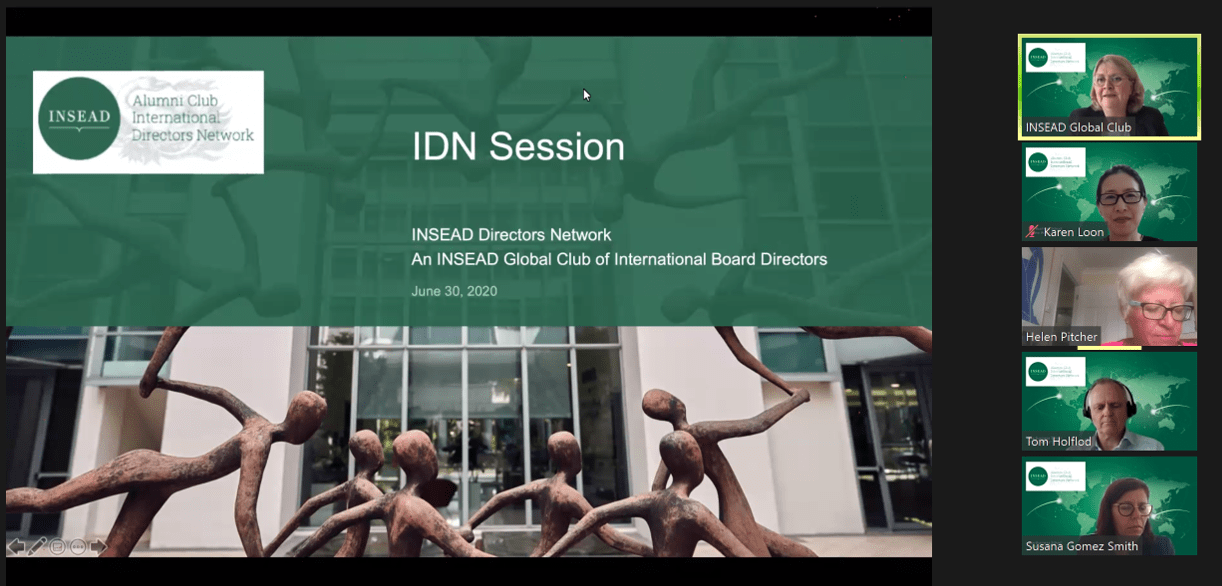By Mary Francia IDP-C, IDN Americas Ambassador
As part of the Leadership Development Series for the INSEAD Alumni in North America, Mary Francia has been delivering webinars designed to help position leaders for C-Suite and Board positions.
This paper is loosely derived from her presentation about how boards function, how boards are changing to meet the emerging demands of the 2020s, and how prospective board members can best land their first director positions.
Part 1: About Corporate Governance
Types of boards
There are different types of boards—seed/early stage, later stage, private, public, not-for-profit, and advisory—and each has different goals, operating procedures, challenges, and expectations for their board members. A startup or early-stage company, for example, typically expects its board members to contribute knowledge—things like how to turn an emergent technology into a business plan, how to scale upwards, or how to court investors. Public boards, meanwhile, expect directors to be stewards of the company’s long-term strategy, advisors to the CEO and executive team, monitors of company performance, and public faces for the company.
When looking for your first board position, it’s important to be familiar with these differences. You also need to decide what kind of board you’re interested in serving on, and what type of board will be best served by your presence on it.
The mandate
The chief goal of the corporate director is to create and protect value for the shareholders; directors do this by guiding strategy, monitoring the financials of the company, managing human capital (especially leadership), and overseeing risk.
In executing this mandate, board members face three main challenges.
- Information: Boards have to be on guard against “window dressing”—i.e., information that is impartially curated and filtered in ways that veil the true health of the company and the viability of its strategy. This often means that directors have to go out of their way to be knowledgable about the company’s performance and fact-check the information they receive.
- Group dynamics: The board is not your typical leadership team, and working together is important, but it’s not always easy.
- Time management: The average corporate director spends 240 hours a year on board work—that’s six forty-hour weeks, excluding travel. And in times of crisis, that 6-week-a-year commitment can turn into a full-time role. Far too many new directors underestimate the amount of time they will have to devote to the job, so it’s important, before you begin looking for a director role, to honestly calculate the feasibility of this commitment.
Fiduciary duties
Boards have three primary duties against which their goal of long-term stewardship and resilience is measured:
- The duty of care (fiduciary and legal responsibility).It sounds like common sense, but directors have a legal obligation to care about their company’s health and to act upon that care. The board of Blue Bell Creameries, for example, faced legal action when—in the wake of a listeria contamination that ended up killing three people—it was demonstrated that the board had failed to recommend or implement any system that would monitor the safety of the company’s product and production methods.
- The duty of loyalty.As is implied above, directors need to be loyal to the company, not to themselves. In other words, directors shouldn’t take advantage of the information available to them because of their role as a board member. Board members can face jail time for offenses such as insider trading.
- The duty of candor. Directors are duty-bound to make full disclosures of pertinent information to other directors, management, and shareholders—regardless of how unpopular or personally inconvenient that information might be.
Part 2: Getting Board Ready
What boards want—the behavioral traits of a good director
- Good directors are balanced judges with strategic clarity. Because CEOs average about five years in their positions but directors generally serve longer, the board gives the company stability of oversight, helping it weather executive transitions and retain continuity of purpose. One aspect of this, and one of the board’s most important jobs, is judging the leadership team’s fitness to steer the company.
- Good directors are skeptics. They are uncomfortable following impulses or gut reactions. They want to see the data and develop a fluent grasp of all the options before they make up their mind.
- Good directors are collaborators. The board as an institution relies on its members to correct each other’s blind spots and those of the executives they oversee—and good directors, directors who value collaboration, thrive in this context.
- Good directors are socially savvy.They are adept at measuring personalities and know how to deliver information to different kinds of people. Like politicians, they need to be able to structure their advice around the emotional and intellectual needs of the people to whom it is addressed.
What boards want—skillsets
For decades, financial expertise, executive experience, and prior board experience were the most desired skillset traits on boards. Recently, however, responding to widened complexity, the speed of change, technological disruption, and a new suite of business risks, the primary expertise profile has expanded significantly to include, among other things, expertise in international politics, sustainability, national security, strategic development, and information technology. This has opened whole new sectors of the workforce to board positions at the highest level.
Certain prerequisites to board service remain in place, however, and all prospective board members should have experience working closely with a board, and/or a developed understanding of corporate governance principles. This is where mentorships and formal director education programs are invaluable.
Seven steps for getting board ready
- Know your motivations.By knowing why you want to join a board, you can better identify what kind of board role you’re best suited and what types of companies and boards that you should consider.
- Identify your proposition. This is harder than it sounds, and it often involves doing some serious self-evaluation. On the positive side, you need to identify both what value you can bring to a board—what specific skills and behavioral traits make you stand out from other prospective board members. But you also need to build a clear picture of the skills, experiences, and knowledge that you don’t yet have—then go about filling in those holes, either by taking classes or changing roles or jobs. Looking for firms that offer leadership development and succession planning programs can be a huge benefit for prospective board members.
- Know where you’re needed.This, too, is harder than it sounds, because director expertise is often relevant outside of the specific industry from which it comes. Finance experts, for example, are highly sought out in non-financial fields—as are technology experts, supply chain experts, and others. Sometimes your expertise may be in high demand in spaces you haven’t considered.
- Write a board CV or bio and tailor it to each board.Just as you might slightly (and truthfully) adjust the emphasis of your resume depending on what job you’re applying for, you need to adapt your CV to highlight the specific skills, experiences, and traits that will be appreciated by boards. In addition to your skills, your CV should outline your motivations, the value you expect to bring to a board, and the specific kind of role you expect to play on the board in question.
- Control your image and reputation. In searching for your first board, you’re trying to project a persona. You can influence your online persona by publishing articles, appearing in interviews, and, conversely, by ensuring that you come across as calm, mature, and balanced in all online appearances.
- Make your interests known.The best way to get on a board is by networking, so it’s important to tell your acquaintances—especially those who currently sit on boards—that you’re interested in a board position. At the very least, these current directors can offer you guidance or act as references. In the best-case scenario, they may be able to introduce you and help bring you onto their board when a vacancy comes up.
- Network responsibly. When self-marketing, it’s essential to put yourself out there while not seeming pushy. You don’t want to appear self-serving or monomaniacal. Attend events, engage with people, and expand your network—these actions will get you seen over time.
Part 3: New Board Challenges
Risks—direct and indirect, short-term and long-term
Boards have a duty to consider risk and risk mitigation from two perspectives: the current cost of mitigation, and the future cost of failing to mitigate. We can see this paradigm in the way companies are currently responding—or not—to climate change, which has a number of significant implications around the world. Given that five of the World Economic Forum’s top 10 global risks for 2020 are environmental in nature, corporate boards can no longer rationalize unsustainable business practices with their duty of care. Today’s board members need to find ways to minimize their company’s contribution to climate change while offsetting their exposure to its fallout.
New Competencies
As mentioned in Part 2, boards are looking for a far more comprehensive range of competencies and experience than they did several decades ago. Public boards especially are now finding it necessary to devote board-level expertise to a number of major categories formerly considered outside the mandate and responsibility of business. These include:
- Environmental expertise: an expert who can realistically gauge the company’s impact on and susceptibility to the environment.
- Social expertise: an expert committed to thinking about the short- and long-term implications of the company’s actions on stakeholders.
- Geopolitical expertise: an expert—probably with experience in academia and/or government—who has the tools to monitor, gauge, and steer strategy around geopolitical fluctuations.
To help manage this diversifying array of risks and responsibilities, some companies are creating adjacent advisory boards whose members help provide subject-specific guidance to directors and executives. For prospective directors, getting a position on an advisory board is a good way to get the corporate governance experience required for more traditional board positions.
Conclusion
It is the job of corporate directors to successfully guide their companies through a business landscape now defined by its exponential rate of technological disintermediation, rising levels of environmental and health risks, and rampant geopolitical uncertainties. These three factors are fundamentally changing what it takes to be a board member, what mixtures of expertise are relevant, and how a board’s composition is directly related to its effectiveness. These changes have significant implications for demographics like women and people of color, who were traditionally excluded from the boardroom but whose presence has now been demonstrated to deliver superior performance and enhance shareholder value. Organizations that fail to enlist this broader range of director expertise and diversity are likely to face a variety of consequences—some short-term, others long-term, some reputational in nature, others existential.
Mary Francia IDP-C is the IDN Americas Ambassador.






